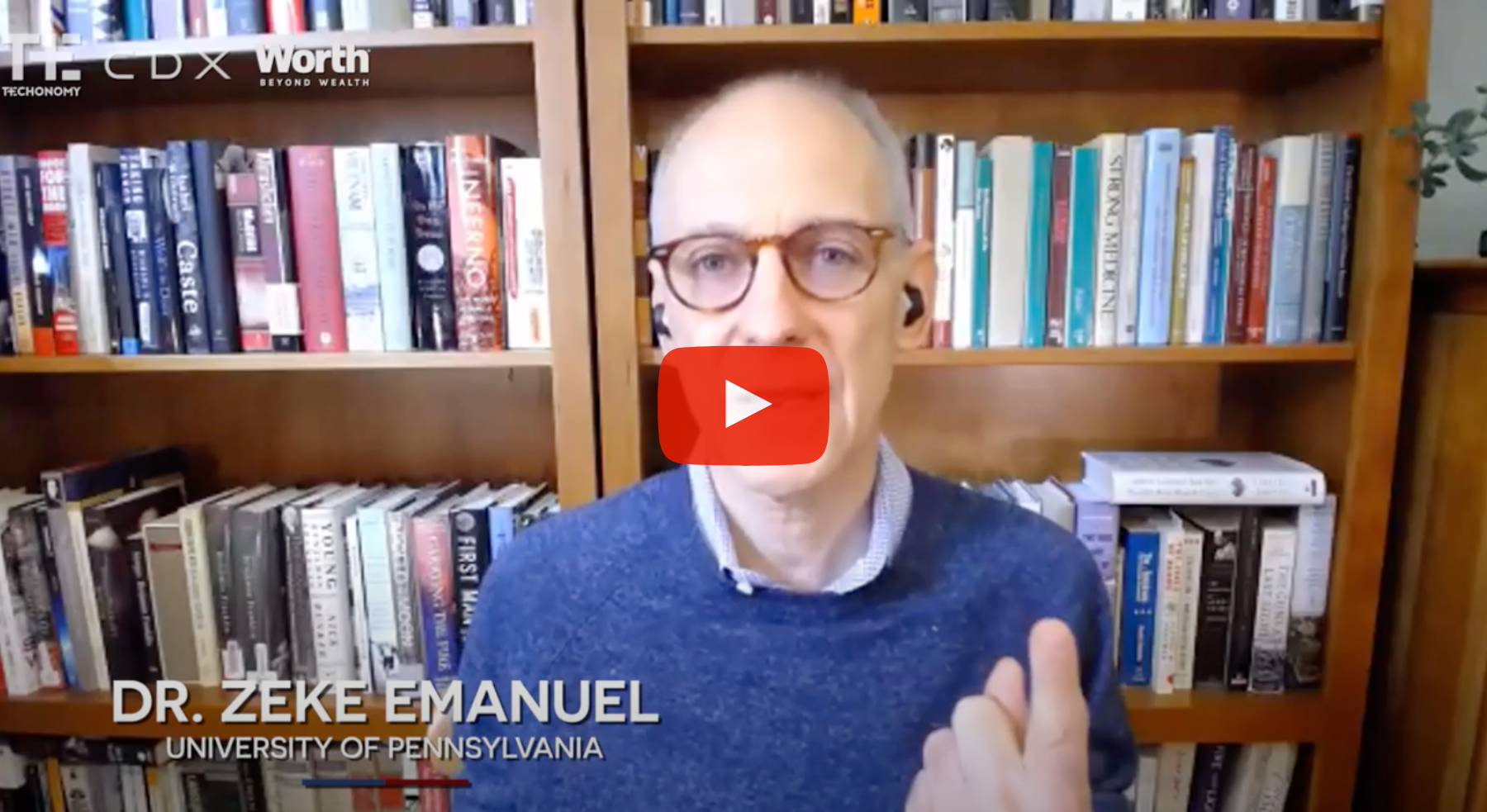Day one of the Health+Wealth of America conference opened with Dr. Zeke Emanuel, a medical ethicist and longtime advocate for reform of American healthcare. He got right down to talking about the things that would really make a difference in America. And it had a lot to do with inequality. Emanuel sees American health and wealth as deeply interconnected.
“If we actually cured all of cancer, we would increase the life expectancy in Americans by 3.3 years,” he said. But his point was not about cancer. The longevity gap between Black and white Americans is so great, he said, that eliminating it would increase life expectancy more than curing all cancers. And COVID has only further increased this health gap–for every 100,000 Black Americans, 98 have died in the pandemic. But for white people only 43 have died per 100,000. This inequality has myriad cascading implications on the rest of American society, Emanuel said. The answer is to focus not so much on improving health care as the “social determinants of health.”

Most of his presentation was thus about the urgent need for early childhood intervention programs for children born into poverty. One of the best ways to do this is through early childhood intervention programs, he said, which can have enormous payoffs later in life. One research study found that every dollar invested in early childhood intervention for America’s poorest children pays an annualized dividend of 13% for many years thereafter. Such interventions and home visiting programs lead not only to reductions in infant mortality, malnutrition and child abuse, but have many later impacts. They are proven to lead later to less substance abuse and criminal offenses, higher graduation rates for high school and college, and improved employment and income throughout life.
Emanuel is also a COVID expert, and said that he does not expect widespread availability of a vaccine for Americans until the fall of 2021. What has separated the U.S. from more-successful nations is that they have had more decisive leadership and as a result more rigorously adopted social distancing and policies like wearing masks.
Next came Dr. Angela Jackson of New Profit, a philanthropy that takes a venture-capital-like approach to funding social entrepreneurs. Jackson oversees its efforts to innovate around the future of work. “We know, with COVID, with unprecedented unemployment rates, that people are thinking real time about how to shift careers,” she said. While most of us thought careers in hospitality and restaurants were automation-proof, we were wrong. Now people who’ve worked in hospitality for 10 or 15 years are asking “What do I do next? What are my transferable skills?” The data shows that tens of millions of Americans without four-year degrees could actually perform higher-paying jobs. They just don’t have a way to validate their skillset. That’s why New Profit is investing in social entrepreneurs to help address these problems at scale. She ended by inviting proposals from the audience for radical ways to intervene and better-prepare people for the changing workplace.

Another speaker was Jutta Steiner of Parity Technologies, which has embarked on an ambitious project to remake the internet around blockchain technology. She described being awakened by the revelations of Edward Snowden, who showed that government was spying on Americans using systems owned by giant internet companies. “It’s really bad to build a system where there is a single point of failure,” Steiner said. “Almost anything that we do online at this point goes through a centralized provider and that’s just not how it should be. Systems that everybody depends on…shouldn’t be governed by Mark Zuckerberg alone.”
Parity has built a blockchain of blockchains called the Polkadot Network, which allows blockchains to interoperate and be easily upgraded. Steiner said that will enable vast innovation that hasn’t otherwise been possible with blockchains. And it will enable the better protection of privacy and security and avoid the control of centralized institutions. She believes ultimately all the applications we regularly use will be built around blockchains. Her goal is to decentralize control, and return governance of the systems they use to people themselves.
We also heard from inspiring entrepreneurs innovating in systems for urban transportation and mental health care. We heard from the head of Dentons, a giant global law firm. And we ended the day with Dr. Quentin Lee, the upbeat and inspiring principal of Childersburg High School in Childersburg, Alabama. He came to fame with an upbeat video emphasizing safe behavior during the pandemic, to the tune of M.C. Hammer’s “Can’t Touch This.” Among his many inspiring and encouraging messages about America’s young people, he told the audience not to let COVID deprive us of the capacity for joy. It was a message that resonated well.
















